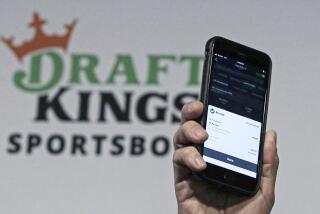USFL Wins Suit Against NFL, Jury Gives It Only $1 : $1.69 Billion Antitrust Case Ends
- Share via
NEW YORK — The National Football League was found liable late today for two antitrust violations but ordered to pay only $1 in damages to the rival United States Football League. The USFL had sought $1.69 billion in its struggle to stay in business.
The verdict, delivered after 31 hours of deliberation over four days, found the NFL used its monopoly power to damage the USFL and to gain control of the pro football market.
In each count, however, the NFL was cleared of monopolizing television, the key accusation in the case.
NFL Commissioner Pete Rozelle was found not liable.
The five women and one man announced the result of their deliberations in U.S. District Court in Manhattan.
The jury was considering six federal antitrust claims and three common law charges against the NFL. If the jurors had found against the NFL on any of the six antitrust claims, the USFL had asked for damages that could amount to nearly $1.7 billion.
60 Questions Asked
The jurors sent only one message to U.S. District Judge Peter K. Leisure on Monday, but it indicated they hadn’t progressed past the first two of 60 questions Leisure ordered them to answer before reaching a verdict. The jury asked Leisure to clarify his instructions about determining the relevant markets and sub-markets for professional football.
In simplest terms, those questions from Leisure asked:
--Is the market in which the USFL and NFL are playing simply professional football, or does the market encompass professional and college football? That is an important distinction, because if college football is included, the NFL’s percentage of the market would be much smaller and its “monopoly” control lessened.
--Is the sub-market of television limited to the three major networks or is cable also included? The NFL argued throughout the 11-week trial that the USFL had access to cable and thus had other outlets even if the three commercial networks were tied up.
In their note to Leisure, the jurors said they wanted clarification of that part of Leisure’s charge, which includes several complex legal points that even some lawyers have difficulty understanding.
More to Read
Go beyond the scoreboard
Get the latest on L.A.'s teams in the daily Sports Report newsletter.
You may occasionally receive promotional content from the Los Angeles Times.










